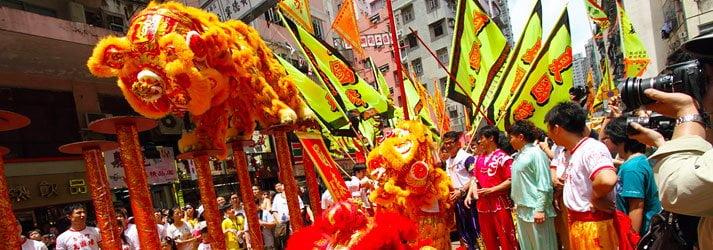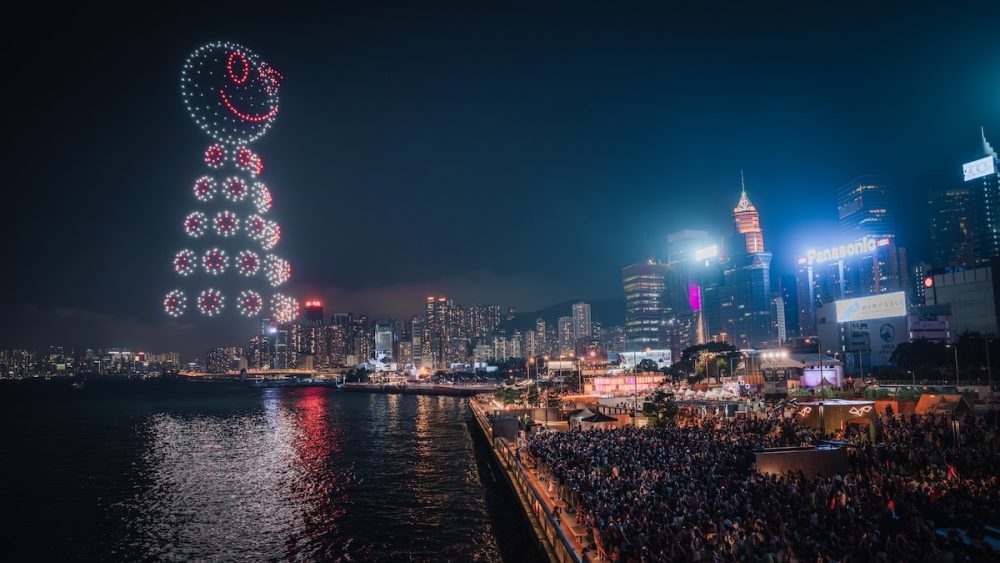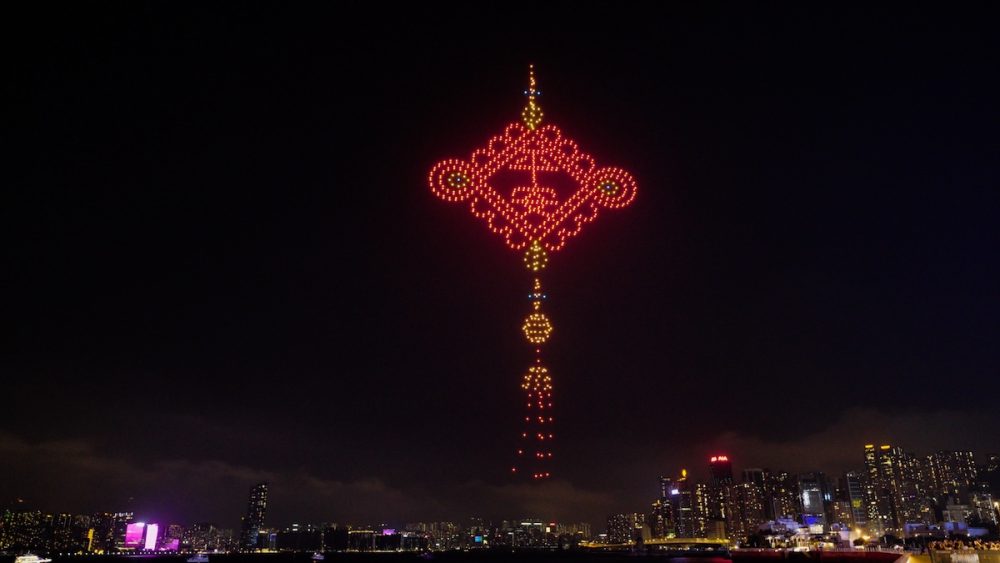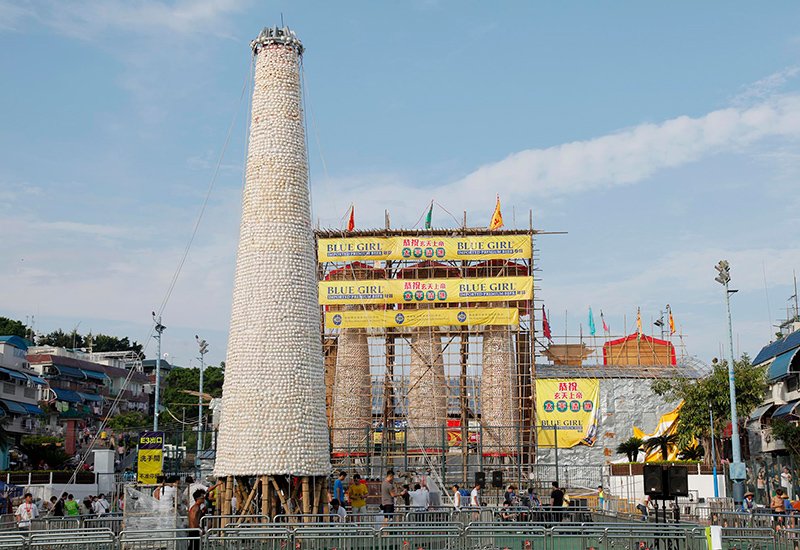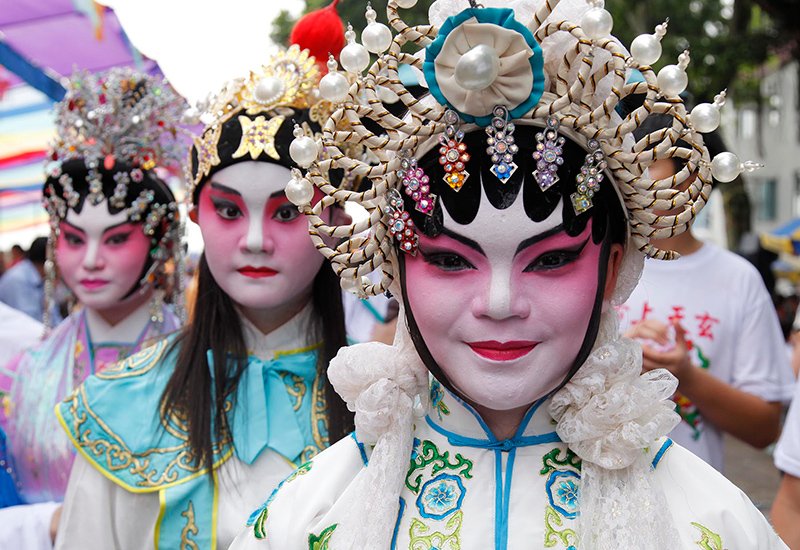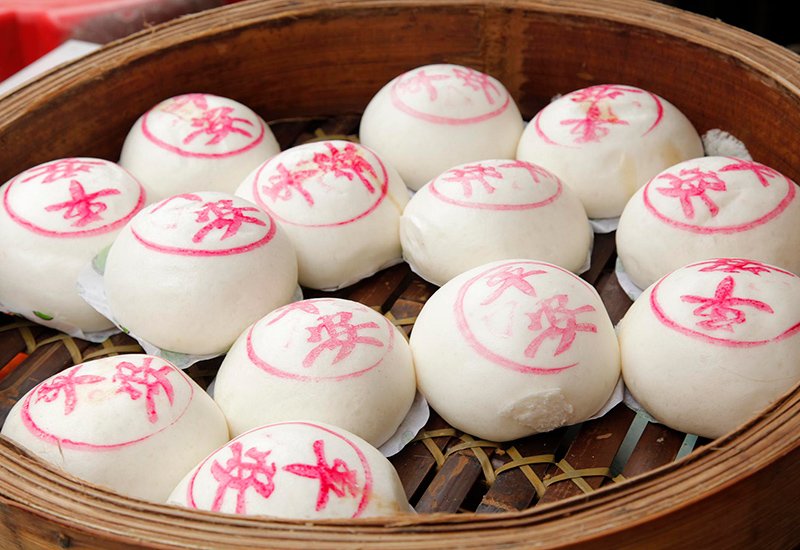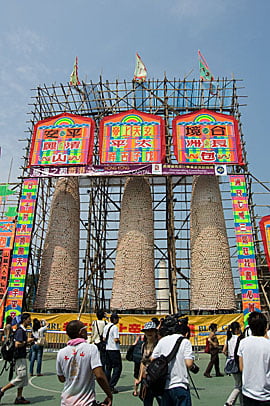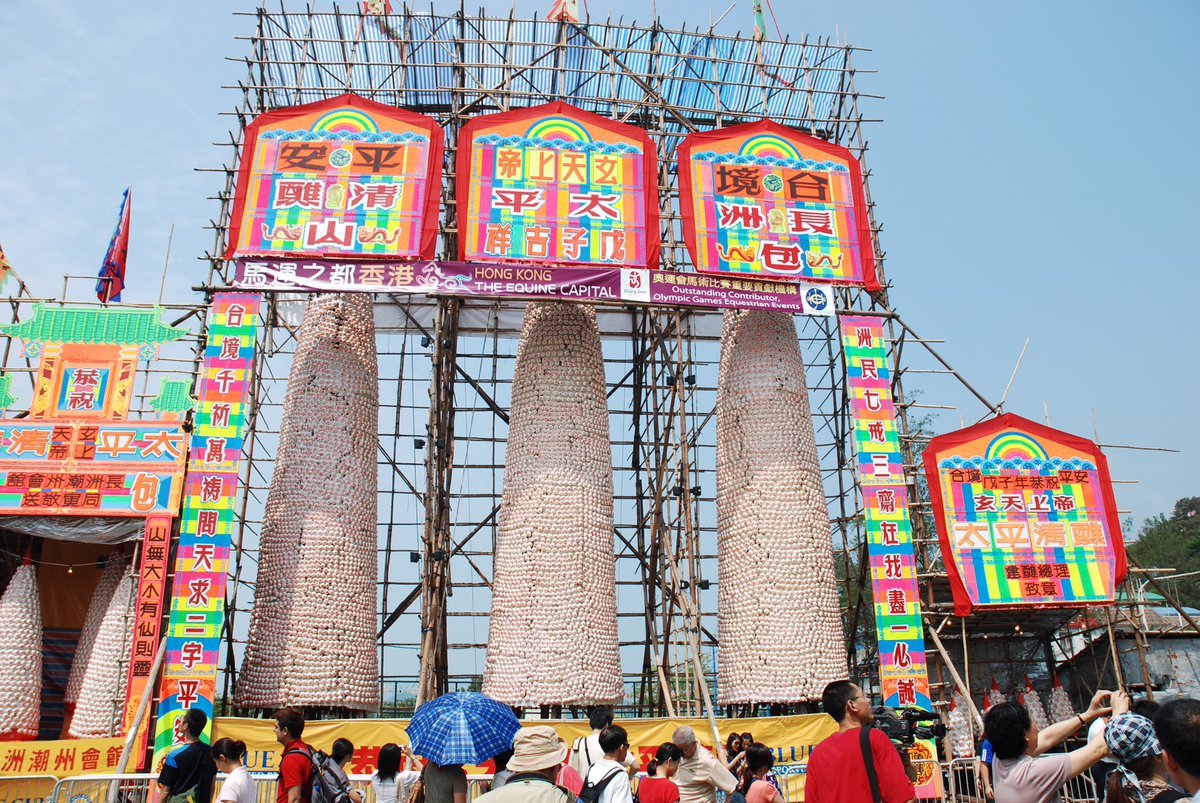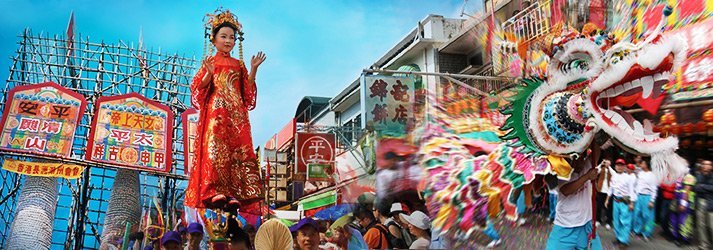HKTB 1 May Drone Show
Date: 8pm, 1 May, 2025
Venue: Victoria Harbour
Tickets: Free
Tag: Cheung Chau Bun Festival
Cheung Chau Bun Festival Drone Show
Cheung Chau Bun Festival Drone Show
Date: 8pm, 11 May, 2024
Venue: Victoria Harbour
Tickets: Free
Cheung Chau Bun Scramble and Piu Sik Parade 2022 Cancelled
The organisers of the annual Cheung Chau Da Jiu, Cheung Chau Bun Festival, have again cancelled the Bun Scrambling Competition and the Piu Sik (Floating Colours) Parade due to ‘Covid’.
The Cheung Chau Jiao Festival takes place on the eighth day of the fourth month of the lunar year, and runs from 6-9 May this year.
Legends say that the festival began after Cheung Chau was devastated by a plague in the late Qing dynasty. To dispel the plague Chiu Chow natives invited Taoist priests to set up a sacrificial altar near the Pak Tai Temple to pray to deities, offer repentance and to comfort departed souls. The residents also paraded deity statues along village lanes.
The plague ended soon after the ritual. Since then, residents on Cheung Chau have been organising the annual Jiao Festival to express gratitude to Pak Tai for blessing the area with peace.
Cheung Chau Da Jiu, Cheung Chau Bun Festival
Date: 6-9 May 2022
Venue: Cheung Chau
Tickets: Free
Cheung Chau Bun Scramble and Piu Sik Parade 2021 Cancelled
The organisers of the annual Cheung Chau Da Jiu, Cheung Chau Bun Festival, have cancelled the Bun Scrambling Competition and the Piu Sik (Floating Colours) Parade due to the ‘Covid’.
The festival, which takes place on the eighth day of the fourth month of the lunar year, runs from 17-20 May this year.
Legends say that the festival began after Cheung Chau was devastated by a plague in the late Qing dynasty. To dispel the plague Chiu Chow natives invited Taoist priests to set up a sacrificial altar near the Pak Tai Temple to pray to deities, offer repentance and to comfort departed souls. The residents also paraded deity statues along village lanes.
The plague ended soon after the ritual. Since then, residents on Cheung Chau have been organising the annual Jiao Festival to express gratitude to Pak Tai for blessing the area with peace.
Cheung Chau Da Jiu, Cheung Chau Bun Festival
Date: 17-20 May 2021
Venue: Cheung Chau
Tickets: Free
Cheung Chau Bun Festival 2021 – Cancelled
Cheung Chau Bun Festival
Date: 17-20 May, 2021
Venue: Cheung Chau
Tickets: Free
Cheung Chau Bun Scramble and Piu Sik Parade Cancelled
The organisers of the annual Cheung Chau Da Jiu, Cheung Chau Bun Festival, have cancelled the Bun Scrambling Competition and the Piu Sik (Floating Colours) Parade due to the ‘Wuhan Flu’ health precautions.
The festival, which takes place on the eighth day of the fourth month of the lunar year, runs from 27th April to 1 May this year.
Legends say that the festival began after Cheung Chau was devastated by a plague in the late Qing dynasty. To dispel the plague Chiu Chow natives invited Taoist priests to set up a sacrificial altar near the Pak Tai Temple to pray to deities, offer repentance and to comfort departed souls. The residents also paraded deity statues along village lanes.
The plague ended soon after the ritual. Since then, residents on Cheung Chau have been organising the annual Jiao Festival to express gratitude to Pak Tai for blessing the area with peace.
Cheung Chau Da Jiu, Cheung Chau Bun Festival
Date: 28 April – 1 May 2020
Venue: Cheung Chau
Tickets: Free
Cheung Chau Bun Festival
Cheung Chau Bun Festival (22-26 May 2015)
It all started with a plague that devastated Cheung Chau in the late Qing dynasty (1644–1911). The islanders built an altar in front of the Pak Tai Temple and petitioned the god Pak Tai to drive off the evil spirits besieging the island, while parading statues of deities through the narrow lanes of their village. The plague ended after the performance of these Taoist rituals and 100 years later the rituals are still performed in a festival that is listed as an intangible part of China’s cultural heritage.
The 2-day event includes Taoist ceremonies, Piu Sik Parade and the Bun Scrambling Competition involving three massive towers of buns.
Piu Sik Parade (2-4pm, 25 May 2015)
The highlight of the festival is the Piu Sik (Floating Colours) Parade. A reenactment of the ceremonial parade held to drive away a plague a century ago sees young children, dressed in the guises of traditional deities and modern celebrities, balance on poles and accompanied by gongs and lion dancers, appearing to float above the crowds in a carnival-like procession.
Bun Scrambling Competition (11:30pm 25 May – 12:30am 26 May, 2015)
Opposite the Pak Tai Temple, competitors stand poised at the bottom of an enormous bamboo tower studded with imitation buns. On the signal, they scramble up it and try to collect as many “lucky buns” as possible. The higher the buns, the more points they are worth.
Cheung Chau Bun Festival
Date: 25 May, 2015
Venue: Cheung Chau
A festive occasion thrice over, the Eighth Day of the Fourth Moon – 17 May 2013
A Festive Occasion Thrice Over, the Eighth Day of the Fourth Moon – 17 May 2013
A festive occasion thrice over, the eighth day of the fourth moon (or month) of the Chinese lunar calendar is the birthday of Tam Kung, an immortal Chinese sea deity, and also commemorated by Buddhists in this part of the world as the birthday of the Buddha. It’s also the climax of the Cheung Chau Bun Festival.
Buddha Bathing Festival
According to Buddhist legend, when the Buddha was born he stood straight, took seven steps, and declared “I alone am the World-Honored One.” And he pointed up with one hand and down with the other, to indicate he would unite heaven and earth. Buddhists are told the seven steps represent seven directions – north, south, east, west, up, down, and here. While Mahayana Buddhists interpret “I alone am the World-Honored One” in a way that “I” represents all sentient beings throughout space and time – everyone, in other words.
Also according to legend, nine dragons sprayed water to bathe the baby Buddha at birth. To commemorate this, at Buddhist temples across Hong Kong, devotees gather to pay their respects to this revered deity by bathing statues of the baby Buddha, with the right hand pointing up and the left hand pointing down, in bowls of water. The ritual is believed to aid in the purification of one’s soul.
Before and after the Birthday of Buddha, celebrants also eat special green cookies, the cookies are deliberately quite bitter, as eating them represents passing through hardship to enjoy better things.
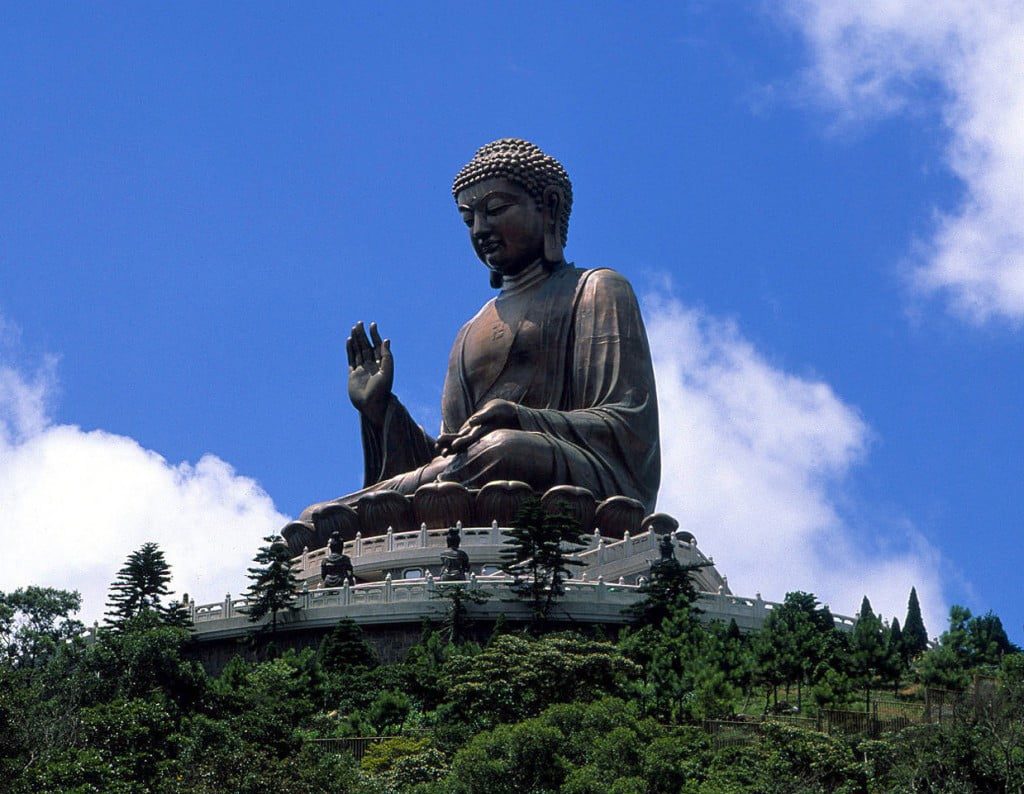
One of the grandest ceremonies is held at the Po Lin Monastery on Lantau Island, home of the Big Buddha and you can find out more about Hong Kong’s Buddhist culture via a tour of Chi Lin Nunnery & Nan Lian Garden.
Tam Kung
Tam Kung, is a Taoist sea deity worshipped in Hong Kong and Macau. With a reputation for being able to control and accurately forecast the weather, Tam Kung – usually portrayed as an 80-year-old man with the face of a 12-year-old child because he is believed to have achieved wisdom at a young age and learned the secret of remaining forever young – has a following among seafarers and a temple in his honour in the former fishing village of Shau Kei Wan was built in 1905 and renovated in 2002 with the original design carefully restored. On May 17, head over to the eastern end of Hong Kong Island for the annual Tam Kung procession by local residents, which includes unicorn, lion and dragon dancing.
